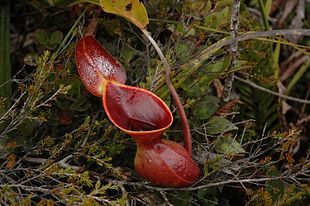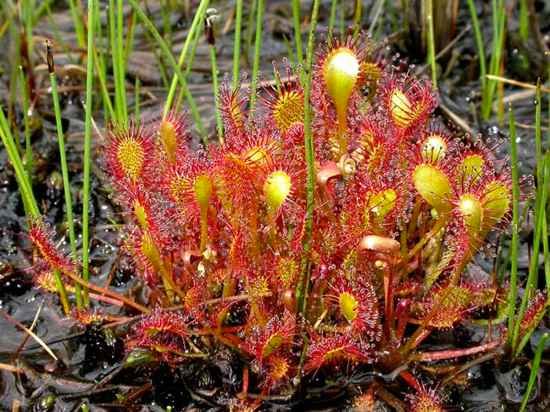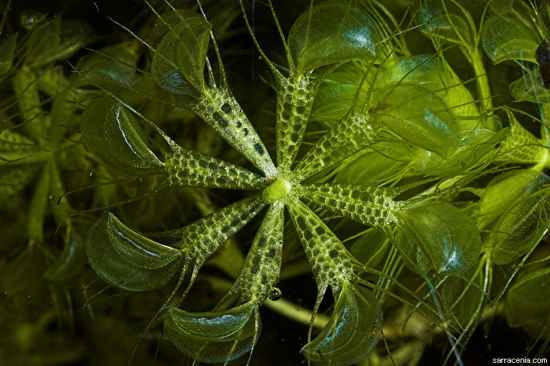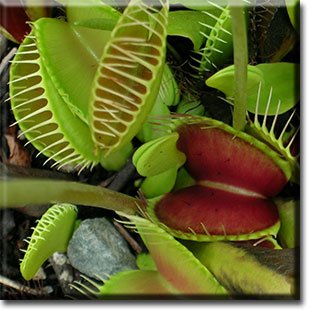When the term carnivore is mentioned, the idea of a quick and strong animal chasing and killing another animal naturally comes to mind. But strangely (or not) some plants are also carnivorous.
Plants that are carnivorous, do not necessarily need animals (or their prey) for the generation of energy, rather they need their prey for essential nutrients necessary for plant growth and metabolism like nitrogen. These carnivorous plants are usually found in soils with very poor nutrients, which normally would not be able to support the growth of other plants.
Below is a list of carnivorous plants and how they capture their prey.
- Tropical Pitcher Plant (Nepenthes lowii )

These plants are mainly found in tropical areas like the Philippines, Malaysia, China, Madagascar e. t. c.
Fun fact: These plants are also called "monkey cups" due to the fact that monkeys have been seen occasionally drink water from rain that accumulates in the pitcher.
Pitcher plants are tall creepers, with sword like leaves with tendrils used for climbing at the tip of the leaf. At the tip of this tendril a cup like pitcher is formed. Glands inside the pitcher secretes sweet, syrupy liquids that attracts insects. When an insect stops and tries to feed on the liquid in the pitcher, they fall and drown inside the liquid. They are then digested and the nutrients are absorbed from the prey.
Fun Fact: Some species of the pitcher plants are capable of trapping and digesting small mammals like rodents e.g rats.
- Drosera or Sundew plant

Fun fact: These plants are found in every continent except Antarctica. So unless you are a scientist conducting a research in Antarctica, this plants may not be far from you!
Sundews posses movable, glandular tentacles, which are covered with sweet, sticky secretions. When an insect lands on the tentacles, the insect is trapped, as the insects struggles to free itself more sticky tentacles move towards the direction of the insect and traps it further. The trapped prey is digested by some glands and the nutrients is absorbed.
Fun Fact: These plants range from 1cm to 1m in height and can live up to 50 years!
- Aldrovanta vesiculosa:

This plant is also know as the water wheel plant. It is an aquatic, floating plants that prey on small aquatic vertebrates and invertebrates.
Fun fact: These plants are very fast growing plants, capable of growing to about 0.4 to 0.9cm per day!
The trap mechanism of the plant is called a snap trap, due to the speed with which it closes. Two lobes come together to form the the snap trap. The outer opening of the trap are covered by hairs that are sensitive to touch. If any prey comes in contact with the sensitive hair the snap trap quickly shuts.
Fun Fact: When stimulated, the snap trap shuts in less than 12 milliseconds, this makes it one of the fastest movement outside the animal kingdom.
- Venus fly trap ( Dionaea muscipula )

This is perhaps one of the most well known carnivorous plant. This plant has about 4 to 7 leaves that grow from a short underground stem. Each leaf is divided into two lobes. The lobes is red in colour due to a red pigment that secretes mucilage. This plant also contains very sensitive hairs inside the lobes.
Fun Fact: The hairs on these plants are so sensitive that, they can distinguish between living and non living stimulus!
When ever the sensory hairs in the lobes of the plant is stimulated by a prey, the lobes quickly snaps shut. The lobes in this plant contains strong, thorn like protrusions, which fits together when the lobe is shut like a teeth and prevents large prey from escaping. Once the prey is securely trapped, the edges of the lobes rapidly grows and fuse together, thereby sealing the trap and creating a type of stomach that enhances digestion of the trapped prey.
Written by Samuel Egbo.

Congratulations @sammye! You received a personal award!
Click here to view your Board
Downvoting a post can decrease pending rewards and make it less visible. Common reasons:
Submit
Congratulations @sammye! You received a personal award!
You can view your badges on your Steem Board and compare to others on the Steem Ranking
Vote for @Steemitboard as a witness to get one more award and increased upvotes!
Downvoting a post can decrease pending rewards and make it less visible. Common reasons:
Submit